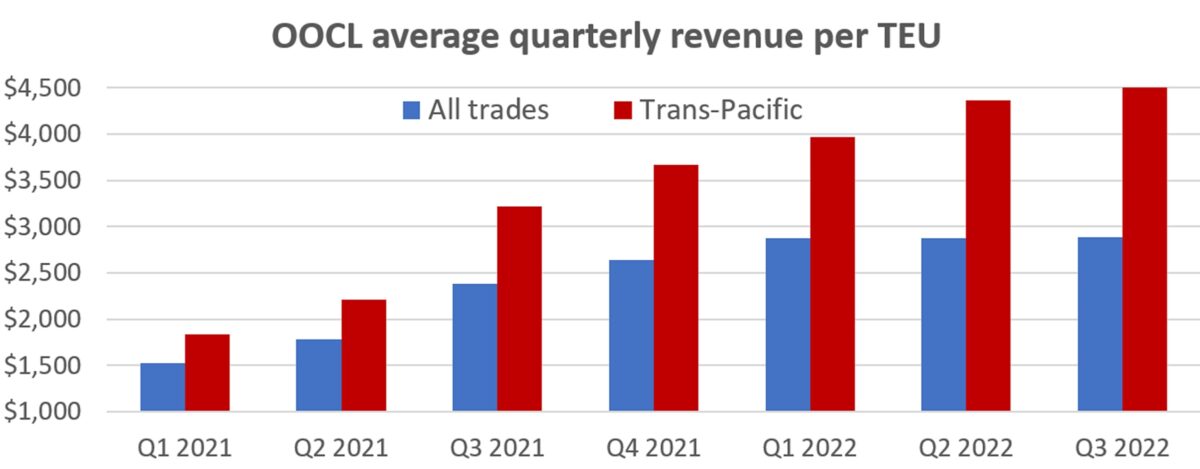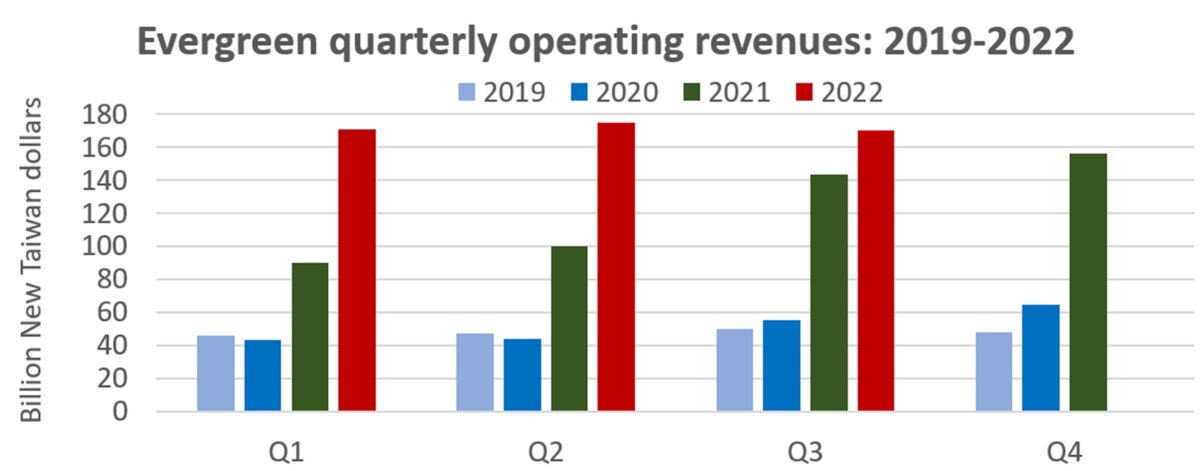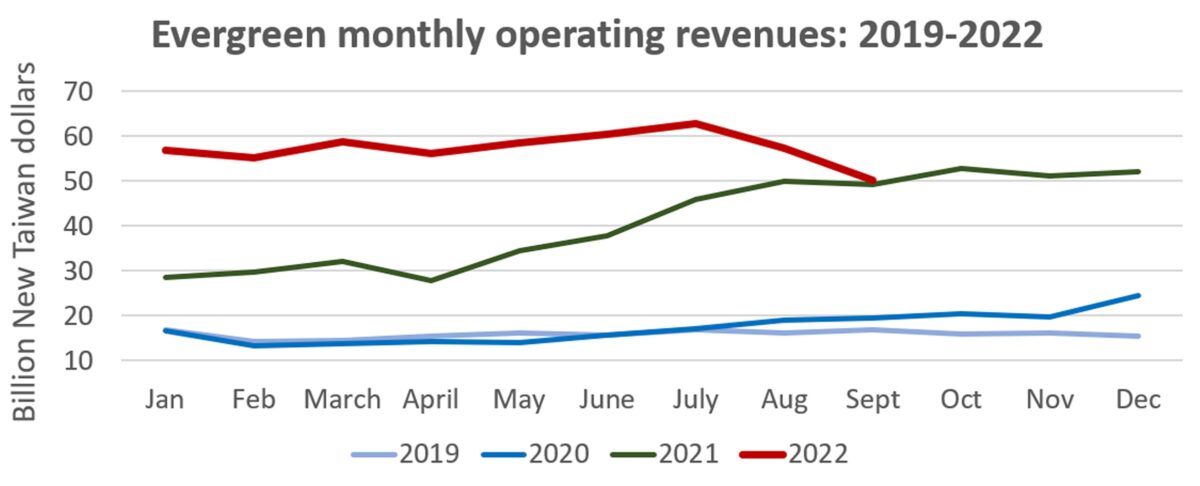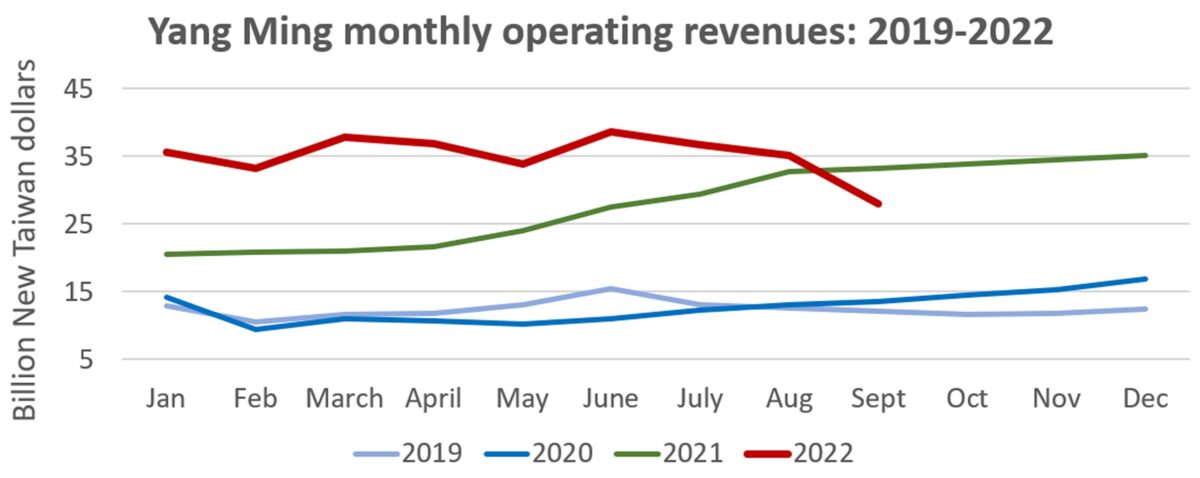There’s no shortage of schadenfreude toward shipping lines these days. After making hundreds of billions in profits during the pandemic, there is gleeful talk of their looming comeuppance — of plummeting spot rates and carriers begging for business.
But anyone expecting shipping lines to book losses anytime soon will be disappointed. They’re still pocketing billions of dollars in profits each quarter. Spot rate declines and volume reductions are still being easily offset by higher contract rates.
Share pricing of listed ocean carriers has plunged in 2022. Zim (NYSE: ZIM) is down 59% year to date, Maersk 42% and Hapag-Lloyd 41%. But still-booming cash flows look like they’ll take a lot longer to wind down than share prices imply.
Recently released data from Asian carriers reveals that financial performance is still close to peak levels and has a very long way to fall before liner operators come even close to breakeven.
Cosco’s second best quarter ever
China’s Cosco Group is the world’s fourth largest container liner operator by fleet size, according to Alphaliner. On Monday, Cosco announced preliminary results for the third quarter of 2022. Net income came in at 32.5 billion yuan (equivalent to $4.53 billion at current exchange rates), up 6.4% from Q3 2021. Earnings before interest and taxes came in at $7.2 billion for Q3, up 6.9% year on year (y/y).
The latest period was the second most profitable quarter in the company’s history, topped only by $5.2 billion in net income in the second quarter.
In the first nine months of this year, Cosco has already earned $1.1 billion more than it did in all of 2021, its previous best year ever.
In a statement on the Hong Kong Stock Exchange, Cosco acknowledged challenges from “the recurrent outbreak of COVID-19, increasing geopolitical tension and the sluggish global supply chain.” Yet it said that “the relationship between supply and demand for international container transportation was relatively tense” and “the export freight rates for the main routes were maintained at high levels.”
OOCL revenue per container still rising
Orient Overseas Container Line (OOCL) is a subsidiary of Cosco that reports revenue results separately on the Hong Kong Stock Exchange.
On Friday, it reported revenues of $5 billion for Q3 2022, up 16.9% from the same period last year. Quarterly volume decreased 3.4%. But the average revenue per twenty-foot equivalent unit jumped 21.1% y/y, to $2,886 per TEU.
That’s the highest global average ever recorded by OOCL. And tellingly, its average revenue per TEU in Q3 inched up 0.4% sequentially versus the second quarter despite the fact that the average Freightos Baltic Daily Index global spot rate assessment was down 32% in the third quarter versus the second.

“It is clear that OOCL’s actual achieved rate trend has yet to show any meaningful impact from decreases in spot indices,” wrote shipping expert John McCown in an online post.
OOCL’s steepest volume decline was on the trans-Pacific, in line with multiple reports of weakening demand for U.S. imports from Asia. The number of TEUs OOCL carried on the trans-Pacific fell 14.4% y/y in Q3, twice the drop than in any of its other trade lanes.
However, OOCL clearly has heavy contract coverage to offset spot weakness in the trans-Pacific. It reported Q3 2022 revenue per TEU of $4,564 per TEU in the trans-Pacific lane. That’s a new record, up 41.9% y/y and up 4.6% versus the second quarter.

September declines for Evergreen, Yang Ming
Two other early indicators of container shipping Q3 earnings hail from Taiwan. Both Evergreen and Yang Ming report monthly operating revenues via the Taiwan Stock Exchange. On Friday, both companies posted September numbers.
The trans-Pacific is Evergreen’s most important trade route by volume. According to Alphaliner, Evergreen is the world’s sixth largest liner operator by fleet size.
From a quarterly perspective, Evergreen revenues are still going strong. Its Q3 2022 revenues came in at 170.4 billion New Taiwan dollars ($5.35 billion), up 17.5% y/y. It was Evergreen’s third highest quarterly total on record, only slightly beneath the first two quarters of this year.

Revenues in Q3 2022 were very close to revenues in the first quarter, when Evergreen posted its best financial result ever: a profit of $3.3 billion.
Monthly data does show revenues peaking and heading down. Evergreen’s monthly revenues slid through the latest quarter. September revenues of 50.2 billion New Taiwan dollars ($1.6 billion) were down 20% from July, when Evergreen posted its highest monthly revenue total on record. That said, September revenues were still triple pre-COVID levels in 2019.

Monthly data for Yang Ming shows an even more pronounced drop. Revenues in September came in at 28 billion New Taiwan dollars ($878 million), down 27.7% from the peak in June and down 15.8% year on year.

Nevertheless, Yang Ming’s September revenues were still more than double pre-COVID levels, highlighting once again that shipping lines are still reaping historically elevated cash flows.
Click for more articles by Greg Miller
Related articles:
- US imports sink in September, suffer steepest drop since 2020 lockdowns
- Tidal wave of new container ships: 2023-24 deliveries to break record
- Shipping giant Maersk: ‘Significantly less demand’ but ‘no hard landing’
- If supply chain crunch is finally easing, why is inflation so high?
- Container shipping lines suddenly a lot less interested in renting ships
- Fall in container spot rates ‘much steeper,’ ‘less orderly’ than expected
- West Coast ports sink to lowest share of US imports since early 1980s







